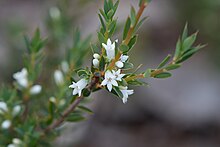Brachyloma ciliatum, commonly known as fringed brachyloma or fringed daphne heath,[2] is a species of flowering plant in the family Ericaceae and is endemic to south-eastern Australia. It is a low-lying or erect shrub with upwards-pointing, egg-shaped to oblong leaves and white, tube-shaped flowers.
| Brachyloma ciliatum | |
|---|---|

| |
| In Cox Scrub Conservation Park | |
| Scientific classification | |
| Kingdom: | Plantae |
| Clade: | Tracheophytes |
| Clade: | Angiosperms |
| Clade: | Eudicots |
| Clade: | Asterids |
| Order: | Ericales |
| Family: | Ericaceae |
| Genus: | Brachyloma |
| Species: | B. ciliatum
|
| Binomial name | |
| Brachyloma ciliatum | |
| Synonyms[1] | |
Description
editBrachyloma ciliatum is a low-lying or erect shrub that typically grows to a height of about 30 cm (12 in) and forms suckers. Its branchlets are softly- or shaggy-hairy. The leaves are directed upwards, egg-shaped to oblong, 4–14 mm (0.16–0.55 in) long and 1.0–3.3 mm (0.039–0.130 in) wide with a small point on the tip. The flowers are arranged singly in leaf axils on a peduncle 0.5–1 mm (0.020–0.039 in) long, with egg-shaped bracteoles 1.2–2.0 mm (0.047–0.079 in) long at the base. The sepals are egg-shaped, 1.5–2.0 mm (0.059–0.079 in) long and the petals white, joined to form a cylindrical tube 2–3 mm (0.079–0.118 in) long with spreading to curved lobes 1.2–2.5 mm (0.047–0.098 in) long and bearded inside. Flowering occurs from October to January and the fruit is a glabrous, oval to spherical drupe 2.6–3.0 mm (0.10–0.12 in) long.[3]
Taxonomy and naming
editThis species was first formally described 1810 by Robert Brown, who gave it the name Lissanthe ciliata in his Prodromus Florae Novae Hollandiae et Insulae Van Diemen.[4][5] In 1868, George Bentham changed the name to Brachyloma ciliatum in Flora Australiensis.[6] The specific epithet (ciliatum) means "fringed with fine hairs".[7]
Distribution
editBrachyloma ciliatum grows in heathland and woodland, in the west of Victoria, and in the north, east and south-east of Tasmania.[2][3][8]
References
edit- ^ a b "Brachyloma ciliatum". Australian Plant Census. Retrieved 16 September 2023.
- ^ a b "Brachyloma ciliatum". State Herbarium of South Australia. Retrieved 16 September 2023.
- ^ a b Albrecht, David E.; Stajsic, Val. "Brachyloma ciliatum". Royal Botanic Gardens Victoria. Retrieved 16 September 2023.
- ^ "Lissanthe ciliata". Australian Plant Name Index. Retrieved 16 September 2023.
- ^ Brown, Robert (1810). Prodromus Florae Novae Hollandiae et Insulae Van Diemen. London. p. 541. Retrieved 16 September 2023.
- ^ "Brachyloma ciliata". Australian Plant Name Index. Retrieved 16 September 2023.
- ^ Sharr, Francis Aubi; George, Alex (2019). Western Australian Plant Names and Their Meanings (3rd ed.). Kardinya, WA: Four Gables Press. p. 163. ISBN 9780958034180.
- ^ Jordan, Greg. "Brachyloma ciliatum". University of Tasmania. Retrieved 16 September 2023.